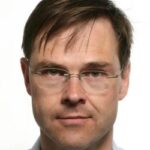Prof Malte Grosche
Biography
Professor Malte Grosche has rejoined the Cavendish in 2007, after six years as a lecturer and reader at Royal Holloway, University of London (2001-2007) and three years (1998-2001) as a postdoc at the Max-Planck-Institute for Chemical Physics of Solids in Dresden. He started out as a Cambridge undergraduate, PhD student at the Cavendish (1991-95) and Trinity College Title A fellow (1994-97).
Research
Prof. Grosche’s group investigate correlated states in quantum materials. Three recent research topics illustrate the nature of this work:
(i) the group uncovered a new mechanism for boosting superconductivity in aperiodic materials such as high-pressure bismuth, which because of its incommensurate crystal structure lacks a unit cell. This causes a low energy sliding mode to arise, which has profound consequences for both superconducting and normal state properties.
(ii) the group have discovered the first unconventional superconductor among layered iron compounds outside the known pnictide and chalcogenide families, YFe2Ge2, in Cambridge-grown crystals of world-leading quality. This finding significantly widens the small group of unconventional superconductors in transition metal compounds and can improve our understanding of high temperature superconductivity in iron pnictide materials.
(iii) the group have combined high precision measurements of the Fermi surface with high pressure techniques, allowing us to determine for the first time the Fermi surface of an inorganic Mott insulator metallised by applied pressure, NiS2. This work combines low temperatures in the milli-Kelvin regime, Cambridge-grown high-quality single crystals, pressures of up to 120,000 atmospheres, ultra-high magnetic fields, and a sophisticated radio-frequency resonance technique. Its success opens the door for new research into the electronic structure at pressure-tuned quantum phase transitions in many materials of intense scientific interest, including Mott, Kondo and topological insulators, f– and d-electron systems with ultra-narrow electronic bands and correlated semimetals.
Work is organised around the strengths of the Quantum Matter group: (i) growing high purity crystals of challenging materials, (ii) multiprobe measurements at extreme conditions of low temperatures, high magnetic fields and high pressure, and (iii) world-class expertise in electronic structure determination using quantum oscillatory phenomena. The research is underpinned by modern and comprehensive equipment, which covers the entire spectrum from crystal growth and characterisation to high pressure measurements in high magnetic fields and at low temperature.
Return to People Directory

Contact Details
Email address:
FMG12@cam.ac.uk
Ray Dolby Centre